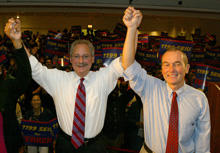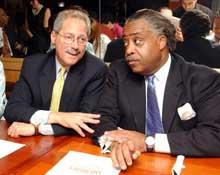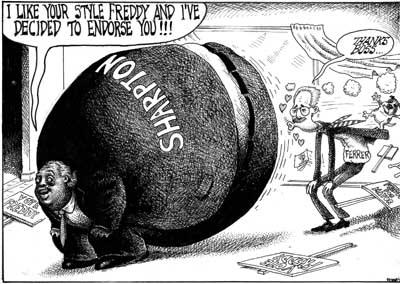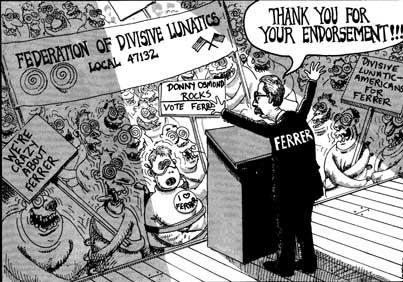Update: oops! I inadvertently switched the time from AM to PM. That has been corrected. The actual post time was indeed 3:47 this morning. (Yes, I was up too late. No, I don't really sleep much during the week.)
Previous:
People in need of an appointment with reality[Update: I originally said Paul Krugman continues to republish his columns on his personal site, which is incorrect. A couple of columns were published on pkarchive.org, but the
Times stopped that.] We can see that Paul Krugman's done it again in
his latest Times column. I finally got around to it, and I must say, Krugman plays the race card so skillfully that he makes Al Sharpton's hand look like only two pair. Having run out of economic spectres, he must now play the part of a shameless race-baiter.
By three to one, African-Americans believe that federal aid took so long to arrive in New Orleans in part because the city was poor and black. By an equally large margin, whites disagree.
Based on a principal subject of my previous post, I'm calling this
Kanye West Syndrome: the slanderous nonsense that "President Bush doesn't like black people," that it had anything to do with the speed of the federal response.
I'm not the first to point out that for supposedly being racist, George W. Bush has appointed Colin Powell, Condi Rice, Janice Rogers Brown, and even Alberto Gonzales. Nor am I the first, but permit me to remind you, that Bill Clinton's administration was far more "white" than GWB's, yet the Clinton's were never accused of "not doing enough" for minorities.
The truth is that there's no way to know. Maybe President Bush would have been mugging with a guitar the day after the levees broke even if New Orleans had been a mostly white city. Maybe Palm Beach would also have had to wait five days after a hurricane hit before key military units received orders to join rescue operations.
After being
castigated in print by the Times public editor, Krugman needs to tread lightly -- at least for now -- and cut back on outrageous claims. He'll still make others so improbable that they can't be dignified as musing fantasies, with the caveat, "The truth is that there's no way to know."
It's a nice verbal trick to dismiss his critics preemptively: "Well I can't know for sure, but you can't either."But in a larger sense, the administration's lethally inept response to Hurricane Katrina had a lot to do with race. For race is the biggest reason the United States, uniquely among advanced countries, is ruled by a political movement that is hostile to the idea of helping citizens in need.
Two whoppers in a two-sentence paragraph. The first one has no logical or empirical basis at all, while the second is an evolution in his standard Marxist rhetoric (which are necessarily a distortion of reality when it comes to Krugman). It's no longer his standard definition of American society as rich versus poor, capitalist owners versus the workers.
Now he's turned it into white, racist capitalist "haves" versus black, exploited "have-nots."People are said to relive the 60s, but Krugman takes the cake. Just what "political movement" is he referring to? I don't know about anyone else, but I can't recall the last time I saw "Let 'em starve" marches. What I do know is that Americans all over are donating untold millions to the Katrina relief efforts, which is
true charity and helping one's fellow man.
Charity is not sitting at home, comforted by the thought that Congress will do the dirty work for us via automatic withheld taxes and $60 billion appropriation bills.I've
written before that we must do charity ourselves, getting our hands dirty, and witnessing just how bad life can be. This is not to brag or make myself out to be a saint, but I've helped out at food pantries, and I've seen how poor some people can be. So many of those families were depending on us for every meal, and the rest of us need to witness that first-hand. No amount of government social spending, with its bureaucratic overhead and inherent waste, can compensate for shocking people into voluntarily donating their time and money, once they see there are people in need. Now, I rarely bring up religion, but as a Christian, I worship a God who taught us to help each other directly, not call upon our leaders to tax us more and institute programs.
Imagine how much more we could donate were it not for all the taxes we pay, and how much more efficiently our money would be spent if we entrusted it to the Red Cross, Salvation Army, and others we know would use it competently. Don Luskin recently wrote about the
$250 million that will be spent on "legal and mental health counseling." How many houses could have been rebuilt with that, or roads paved,
or families fed? The reasoning behind that spending provision befits no one but a 21st century Marie Antoinette: families may have to ration their food, with public shelter their only refuge, but let them have good shrinks.
Notice that Krugman curiously used "citizens" instead of "people." If a Republican had said it that way, he'd be accused of racism, xenophobia, and ultra-radical right-wing fascist-nationalist extremism.If any single political thought "rules" the country, it's the erroneous belief in government paternalism, that government's role is to protect and take care of us when anything goes wrong, and that we're
"entitled" to government help. Though that didn't germinate with FDR, it certainly saw full flower once the New Deal got underway. So the reality is that the U.S. is hardly the unique example Krugman thinks -- most of Europe is far better at the welfare state than we are.
Race, after all, was central to the emergence of a Republican majority: essentially, the South switched sides after the passage of the Civil Rights Act. Today, states that had slavery in 1860 are much more likely to vote Republican than states that didn't.
And what about all those years, from after the Civil War to the 1960s, that formerly slave states were voting solidly
Democratic?
Thank goodness Krugman doesn't teach history, although when you look at some of his
bad economics and
economic Armageddon predictions, you wonder how he can teach
that. The South's period of Jim Crow, lynchings and other terrible crimes was principally while Southern states were
Democratic strongholds. Political parties are quite irrelevant to the terrible crimes that were indeed racially motivated, but if Krugman wants to make this a partisan issue, let's be fair.
I should note that his second sentence is his common error of assuming that correlation is causation, like when he said
"And don't forget that President Clinton's 1993 tax increase ushered in an economic boom." (I never noticed until now that Krugman violated the Times' stylistic standard, calling him
President Clinton instead of
Mr. Clinton.) The South became staunchly Democratic for decades as a reaction to the generally Republican North, but not entirely because of slavery, or that the Republican North had devastated much of the South. It was after several Southern states initially refused to ratify the Fourteenth Amendment. The Union Army was sent to occupy their capitals and effectively institute martial law, until the legislatures would "cooperate." I discussed this at length in my entry
"Historical Revisionism" -- referring to
Republican historical revisionism.
And who can honestly deny that race is a major reason America treats its poor more harshly than any other advanced country? To put it crudely: a middle-class European, thinking about the poor, says to himself, "There but for the grace of God go I." A middle-class American is all too likely to think, perhaps without admitting it to himself, "Why should I be taxed to support those people?"
I can honestly deny it, and I'm also unaware that I've treated any poor people "harshly."
Again, Krugman's pulling another "correlation equals causation" trick. Of the world's advanced economies, only the U.S. has a very racially heterogeneous population. So according to Krugman, since the U.S. has poor people, and some are minorities, their conditition
must be the product of racism. Krugman will accept nothing else but some mythos to support his agenda. Instead of trying to find the spectre of Jim Crow, how about we take a cold look at the last 40 years of the "War on Poverty"? It's virtually reared black Americans in a new form of slavery: dependency on government.
To put it bluntly, a typical middle-class European doesn't have enough money left after taxes to think about giving significantly to charity, nor do most Europeans today grow up with a belief in private charity (see above where I talked about the necessity of getting your hands dirty). Meanwhile, the middle-class American thinks, "Why should I be taxed to support people
who could support themselves?" Considering that Americans give $250 billion annually in private charitable donations, how can anyone even insinuate that we're stingy, let alone slander us like Krugman is doing?
Or would Krugman say I treat subway beggars "harshly" because giving them handouts is rarely a good idea? Remember the one who said
"The government doesn't give me enough?" This can only demonstrate the superiority of private charity, because only the individual, in the actual process of giving money, can determine whether the recipient is worthy. Government, I've said before, only cares about enrolling the most people so the programs can appear successful, regardless of their efficiency or results.
Above all, race-based hostility to the idea of helping the poor created an environment in which a political movement hostile to government aid in general could flourish.
What poppycock! It's the same outright misrepresentation that Krugman used in the
Great Social Security Debate. His statist attitude is that if government doesn't do it, nobody can. But like St. Paul said at the end of 1 Cor. 12, "yet shew I unto you a more excellent way": that people help themselves and each other. This is the love, the true love, that he talked about in chapter 13.
By all accounts Ronald Reagan, who declared in his Inaugural Address that "government is not the solution to our problem; government is the problem," wasn't personally racist. But he repeatedly used a bogus tale about a Cadillac-driving Chicago "welfare queen" to bash big government. And he launched his 1980 campaign with a pro-states'-rights speech in Philadelphia, Miss., a small town whose only claim to fame was the 1964 murder of three civil rights workers.
Krugman talks about the "welfare queen" as if such people didn't exist, but it's only natural, because he refuses to believe that big government can fail. There were three families on my block, when I grew up in a working-class neighborhood, that abused the system; I should know as much as anyone how government "charity" never bothers to scrutinize the recipients.
Under George W. Bush - who, like Mr. Reagan, isn't personally racist but relies on the support of racists -
Which is worse, to receive the support of a few people with whom you disagree, or the people of a certain state who consistently reelect a certain elderly veteran of the Senate with a horribly racist past?
I cannot grasp the convoluted logic of insinuating bad things about an elected official just because of the bad traits of an exceedingly few that voted for him.
the anti-government right has reached a new pinnacle of power. And the incompetent response to Katrina was the direct result of his political philosophy. When an administration doesn't believe in an agency's mission, the agency quickly loses its ability to perform that mission.
This is laughable at best. While Bush has a few policies I agree with, in all frankness, he's hardly the staunch anti-government crusader that Krugman makes him out to be, nor is the U.S. dominated by such an ideology. I'm not sure which
Bush speech that Krugman heard the other night, but it certainly sounded to me like a speech about big government and why we should love it. Krugman won't support that kind of big government, though, as
Don Luskin recently explained: "...he loves it when his party controls it, and hates it when anyone else does."
By now everyone knows that the Bush administration treated the Federal Emergency Management Agency as a dumping ground for cronies and political hacks, leaving the agency incapable of dealing with disasters. But FEMA's degradation isn't unique. It reflects a more general decline in the competence of government agencies whose job is to help people in need.
The real blame lies with Louisiana officials, who were the ones that delayed in asking for federal help (notwithstanding my opposition to a federal agency like FEMA).
However, while not speaking specifically, I won't deny that certain appointments are purely political. That's an unavoidable symptom of...
big government.
For example, housing for Katrina refugees is one of the most urgent problems now facing the nation. The FEMAvilles springing up across the gulf region could all too easily turn into squalid symbols of national failure. But the Department of Housing and Urban Development, which should be a source of expertise in tackling this problem, has been reduced to a hollow shell, with eight of its principal staff positions vacant.
And like a good statist, Krugman is more worried about having
enough bureaucrats, rather than qualified and good ones who will actually do something. Just what would these eight positions serve? Would they travel to New Orleans and physically help in the construction, or would they sit back in Washington, collecting paychecks while poring over superfluous paperwork?
But let me not blame the Bush administration for everything. The sad truth is that the only exceptional thing about the neglect of our fellow citizens we saw after Katrina struck is that for once the consequences of that neglect were visible on national TV.
And just how did we "neglect" them? Perhaps because big government
was too slow to respond, while
Louisiana officials turned away the Red Cross and Salvation Army from helping?
Consider this: in the United States, unlike any other advanced country, many people fail to receive basic health care because they can't afford it. Lack of health insurance kills many more Americans each year than Katrina and 9/11 combined.
But the health care crisis hasn't had much effect on politics. And one reason is that it isn't yet a crisis among middle-class, white Americans (although it's getting there). Instead, the worst effects are falling on the poor and black, who have third-world levels of infant mortality and life expectancy.
As Don Boudreaux so well pointed out last January,
"...lack of health insurance is not the same thing as lack of health care – and much health care is readily affordable even without a shred of insurance; and losing a job in America doesn't mean starvation and death."Far more people die each year than from Katrina and the 9/11 attacks
not because they couldn't get health care, but because they failed to take care of their own health. Oh, there's yet another thing for which Krugman wants
a big government solution. But I thought this "crisis" was not just among the "poor and black."
I suggest that Krugman look at page 6 of
this PDF datasheet from the Population Reference Bureau, keeping in mind that
American blacks' life expectancy is about 72 years. There are a
few countries that might be considered Third World and have life expectancies around 70 years, but the truth is that blacks in the U.S. have far, far better life expectancies than practically all Third World nations.
I'd like to believe that Katrina will change everything - that we'll all now realize how important it is to have a government committed to helping those in need, whatever the color of their skin. But I wouldn't bet on it.
Do Americans give $250 billion to charity every year with any concern for the recipients' skin tone? Haven't virtually Americans, perhaps not to the recently projected extent and though big government isn't the way to do it, supported massive federal assistance to Katrina victims?
Labels: Big government, Government charity, Katrina





